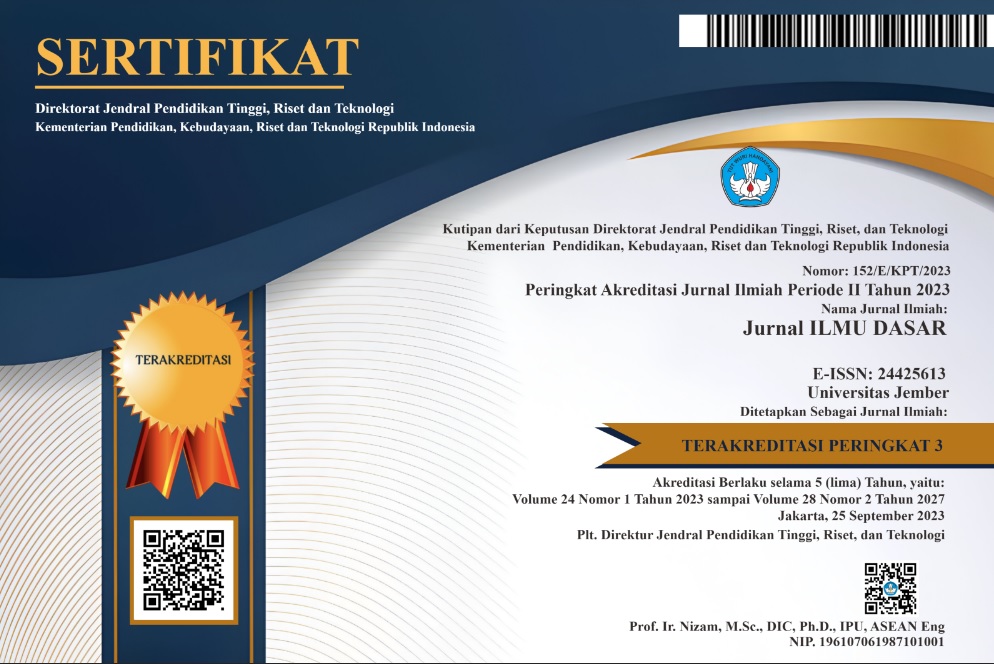Effect of Potassium Fertilization on Growth and Head Rice Yield of Rice (Oryza sativa L.) Merah Wangi Variety
DOI:
https://doi.org/10.19184/jid.v21i1.9144Abstract
The fertilization management is one strategy to optimize the quantity and quality of rice production. Our study was aimedto investigate the effect of potassium fertilization several agronomical parameters andthe rate of head rice after milling process. The study was conducted from March 2018 to July 2018 in the Agrotechnopark experimental field University of Jember in District of Sukorambi, Jember. Randomized Block Design (RBD) was used with the frequency of potassium chlorice (KCl) fertilization asthe single factor. The conducted potassium treatments were as follows: without KCl fertilization (control), one-time KCl fertilization, two times KCl fertilization, three times KCl fertilization and each fertilization level was conducted by sixrepetitions. The agronomic parameters such as plant height, tiller number, flowering time, rate of productive tillers, grain number per panicle, weight of 1000 grains, and percentage of filled grain were analyzed and percentage of head rice rate was determined as quality parameter. Our results showed that different treatment of potassium did not significantly affect the plant height, tillernumber, flowering time, rate of productive tillers, total grains per panicle, and weight of 1000 grains. On the other hands, the percentage of filled grainand the rate of head rice after milling were significantly increased by potassium fertilization. Compare to the control treatment, three times potassium fertilization resulted 9.24% and 13.83% increase of filled grain and head rice after two times milling, respectively. Our result suggest that potassium fertilization is important for grainquality of Merah Wangi rice variety.
Keywords: Merah Wangi, potassium fertilization, growth, physical quality.
Downloads
References
Badan Standarisasi Nasional. 2015. SNI Beras 6128:2015. Badan Standarisasi Nasional.
Gardner FP, Pearce, RB & Mitchell, RL. 1991. Fisiologi Tanaman Budidaya. Jakarta: UI Press.
Indrasari, SD, Wibowo P & Purwani EY. 2010. Evaluasi Mutu Fisik, Mutu Giling dan Kandungan Antosianin Kultivar Beras Merah. Penelitian Pertanian Tanaman Pangan, 29(1): 56-62.
Hartati, S., Suryono & Purnomo D. 2018. Effectiveness and Efficiency of Potassium Fertilizer Application to Increase the Production and Quality of Rice in Entisols. Earth and Environmental Science, 142(1):1-8.
Lakudzala, DD. 2013. Pottasium Response in Some Malawai Soils. International Letter of Chemistry. Physics and Astronomy. 8(2): 175-181.
Paini, SW, Suteja AM, Suseno TI.P, Monika P, Saputrajaya W dan C. Ligouri. 2014. Pengaruh Perbedaan Warna Pigmen Beras Organik Terhadap Aktivitas Antioksidan. Agritech, 34(4):399-407.
Subandi. 2013. Perandan Pengelolaan Hara Kalium untuk Produksi Pangan di Indonesia. Pengembangan Inovasi Pertanian, 6(1):1-10.
Subroto, M.A. 2008. Real Food True Health: Makanan Sehat untuk Hidup Lebih Sehat. Jakarta: Agromediapustaka.
Toha, H.M., K. Permadidan S.J. Munarso. 2002. Pengaruh Pemberian Pupuk Kalium dan Nitrogen terhadap Hasil Padidan Mutu Beras Varietas IR64. Pertanian Tanaman Pangan, 21(1):20-29.
Wihardjaka, A. 2002. Pola Perubahan Ketersediaan Kalium dalam Tanah Selama Pertumbuhan Padi di Lahan Sawah Tadah Hujan. Penelitian Tanaman Pangan, 21(3):15-23.
Yonathan, C. dan A. Suhendra. 2013. Perbandingan Pengaruh Nasi Putih dengan Nasi Merah Terhadap Kadar Glukosa Darah. Kedokteran, Universitas Kristen Maranatha, Bandung.








